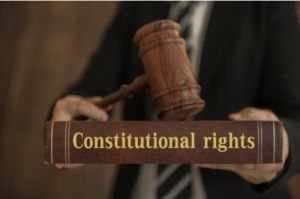
Traffic stops are the most common reasons for police encounters, and approximately 10% of all drivers are pulled over for traffic infractions each year. Most drivers understand that they have certain rights during traffic stops, often these rights are misunderstood or go unexercised. Criminal charges stemming from a traffic stop are often unjustifiable because of constitutional violations before, during, or after the stop. Knowing your rights during a Wisconsin traffic stop may protect you from unlawful criminal charges.
 Constitutional Rights
Constitutional Rights
The Fourth Amendment prohibits law enforcement officers from unreasonably searching or seizing either a person or his or her belongings. This generally means law enforcement officers must obtain a warrant prior to a seizure.
However, just because a traffic stop was legally justifiable, it does not mean law enforcement officers have the right to search your vehicle and personal belongings. Illegal vehicular searches pursuant to a traffic stop also violate your Fourth Amendment rights, and any evidence seized during an illegal search must be excluded from judicial consideration. Police officers must articulate another legally justifiable reason for searching your vehicle without a warrant. These justifications include things like emergencies, seeing illegal items in plain sight, smelling items such as marijuana, consent and arrest.
Any evidence of criminal activity discovered pursuant or incidental to a legally justifiable search is admissible in court and may be used to obtain a warrant, make an arrest, or press charges.
 The Right to Remain Silent
The Right to Remain Silent
During a traffic stop you also have the right to remain silent. It is common to feel the need to answer all of the officer’s questions, but you do not have to. The exception to this is that officers are allowed to ask for a person's license, registration, and proof of insurance upon pulling someone over. This you must comply with.
While you do not want to be rude or uncooperative with an officer. Be aware that answering a question like “Do you know how fast you were going?” can be used against a driver later.
 Understanding and Asserting your Rights
Understanding and Asserting your Rights
Drivers and passengers maintain certain constitutional rights even during a legal traffic stop. These rights are:
· The right to remain silent, such as not answering police questions beyond identifying
yourself or a weapon. If an officer asks, “how fast do you think you were going?”, you do
not have to answer.
· The right to refuse consent to search
· The right to an attorney if you’re being arrested and removed from the vehicle
· Passengers may have the right to leave the vehicle if safe to do so. This depends on the
motivation for the stop, and passengers should always ask if they are free to leave.
· The right to minimal necessary detention. The police may not keep you pulled over for
hours while waiting for drug dogs. They must make a reasonably quick determination to
either ticket, release, or arrest you.
Once you have been pulled over, you do have to comply with certain police requests. You are not free to leave even if the stop was illegal, and you must provide identifying information to officers. You are also required to inform officers of the presence of firearms in a vehicle. An illegal stop may result in the dismissal of traffic charges, but it does not justify failure to comply with certain laws.
If you’ve been charged with a serious traffic offense or a criminal offense stemming from a Wisconsin traffic stop - contact us today for a free consultation. It is crucial to retain an experienced criminal defense lawyer as soon as possible. Please contact us by text or phone at (414) 774-6000 or email at laura@jlfwisconsin.com anytime.
*Any articles in the Libra or posted by Jones Law Firm LLC are not legal advice for a particular client or situation. Further no attorney-client relationship is intended or created with this post.*

